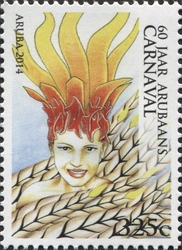Stamp: 60th Aruban Carnival (Aruba 2014)
60th Aruban Carnival (Aruba 2014)
13 February (Aruba ) within release 60th Aruban Carnival goes into circulation Stamp 60th Aruban Carnival face value 3.25 Aruban florin
| Stamp 60th Aruban Carnival in catalogues | |
|---|---|
| WADP Numbering System - WNS: | WAD:AW010.14 |
Stamp is vertical format.
Also in the issue 60th Aruban Carnival:
- Stamp - 60th Aruban Carnival face value 3;
- Stamp - 60th Aruban Carnival face value 3;
- Stamp - 60th Aruban Carnival face value 3.25;
- Stamp - 60th Aruban Carnival face value 3.25;
|
Data entry completed
80%
|
|
|---|---|
| Stamp 60th Aruban Carnival in digits | |
| Country: | Aruba |
| Date: | 2014-02-13 |
| Size: | 26 x 36 |
| Perforation: | 14 by 14 |
| Format: | Stamp |
| Face Value: | 3.25 Aruban florin |
Stamp 60th Aruban Carnival it reflects the thematic directions:
Carnival (known as Shrovetide in certain localities) is a festive season that occurs at the close of the Christian pre-Lenten period, consisting of Quinquagesima or Shrove Sunday, Shrove Monday, and Shrove Tuesday or Mardi Gras.
Costume is the distinctive style of dress and/or makeup of an individual or group that reflects class, gender, occupation, ethnicity, nationality, activity or epoch—in short, culture.
Humans (Homo sapiens, meaning "thinking man") or modern humans are the most common and widespread species of primate, and the last surviving species of the genus Homo. They are great apes characterized by their hairlessness, bipedalism, and high intelligence. Humans have large brains, enabling more advanced cognitive skills that enable them to thrive and adapt in varied environments, develop highly complex tools, and form complex social structures and civilizations. Humans are highly social, with individual humans tending to belong to a multi-layered network of cooperating, distinct, or even competing social groups – from families and peer groups to corporations and political states. As such, social interactions between humans have established a wide variety of values, social norms, languages, and traditions (collectively termed institutions), each of which bolsters human society. Humans are also highly curious, with the desire to understand and influence phenomena having motivated humanity's development of science, technology, philosophy, mythology, religion, and other frameworks of knowledge; humans also study themselves through such domains as anthropology, social science, history, psychology, and medicine. There are estimated to be more than eight billion living humans.
